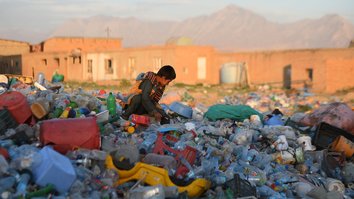KABUL -- Afghan economic, political and educational achievements made over the last 20 years have all been wiped out in the past two years, say observers.
A lack of strategic economic planning at the executive level has caused poverty and an exodus of material and human assets from the country, leaving Afghanistan in a constant state of humanitarian and economic crisis.
"Afghanistan has experienced a downward spiral and reversal in growth and development in different areas -- especially in the economic arena -- in the last two years," Shaker Yaqoobi, a Kabul-based economic analyst, told Salaam Times.
"The economy faced contraction on several indicators, while hunger, poverty, and unemployment significantly increased. According to the United Nations, more than 28 million people need humanitarian assistance, and more than six million others face famine," Yaqoobi said.
![Afghan women take free bread from a charity during the holy month of Ramadan in Kabul on April 13. [Wakil Kohsar/AFP]](/cnmi_pf/images/2023/08/16/43507-33d62zd-highres__1_-585_329.jpg)
Afghan women take free bread from a charity during the holy month of Ramadan in Kabul on April 13. [Wakil Kohsar/AFP]
The country's entire population was 41.1 million in 2022, the World Bank estimates.
"Numerous economic and development projects that were being implemented with the international community's financial assistance ... are either canceled or suspended because of lack of budget and capacity," he said.
"There is no planning for the development, growth and economic improvement of the country."
"A lack of strategic economic and trade programs ... has led to more than 97% poverty. Investment and trade have decreased and led businesses to take their investments out of the country and invest them abroad," he said.
"Poverty and unemployment have increased in the last two years," Azarakhsh Hafizi, a former member of the Afghanistan Chamber of Commerce and Investment and economic analyst based in Germany, said.
"We have seen unprecedented levels of malnourishment and hunger ... people have even had to sell their kidneys and children to feed their families. The situation can't be worse than this," Hafizi said.
"A humanitarian catastrophe could have [resulted] in the loss of millions of lives if it weren't for the international assistance."
"Afghanistan's GDP and per capita income have shrunk by 35 and 50% [since August 2021], respectively," Hafizi said, adding that purchasing power has also dropped.
Lost achievements
Unemployment has also increased from 50% to 74% since August 2021, Fahim Chakari, a university professor in Kabul, told Salaam Times.
Most educated Afghans are trying to flee the country, he added.
"Four hundred university professors have fled the country in the past two years alone," he said.
"Unfortunately, today Afghanistan is losing its financial and human assets amid a rapid brain drain. Unlike today, two years ago, these experts were at work trying hard to develop Afghanistan."
"A country can achieve growth and development when it has a development budget. The current government has only an operational budget but no budget for development projects," Chakari said.
Two years ago, "public services were being delivered regularly, and every Afghan man and woman had the right to elect and be elected in democratic processes, and the government was accountable," said Ishaq Atmar, a university professor and political analyst based in Germany.
"Unfortunately, that is no longer the case today," Atmar said.
"Both boys and girls had historical and golden opportunities to pursue their education with millions of youth attending schools and universities, while the number of educated members of society drastically increased," he added.
"An unprecedented and historical transformation happened in our society, but today we are witnessing its reversal, and all our historical and golden achievements are lost."
Women have lost the most.
"In the past two decades [before August 2021], Afghan women got access to their natural, human, and Islamic rights for the first time," said Suraya Paikan, a women's rights activist and former deputy minister of higher education based in Türkiye.
"Afghan women and girls were given the right to education and work ... More than 10 million boys and girls went to school, and thousands of girls graduated from universities."
"Afghan women and girls had a prominent presence in society and were appointed ministers, governors, mayors, deputy ministers, directors and judges and [were elected to] parliament, but unfortunately, history repeated itself in the last two years and all of the women's achievements were lost," she said.
Today, Afghan girls are deprived of their right to education, leaving them isolated and trapped at home, Paikan said.

![Afghan women protest for their rights at a beauty salon in the Shahr-e-Naw area of Kabul on July 19. [AFP]](/cnmi_pf/images/2023/08/16/43506-33pb2nw-highres-585_329.jpg)






